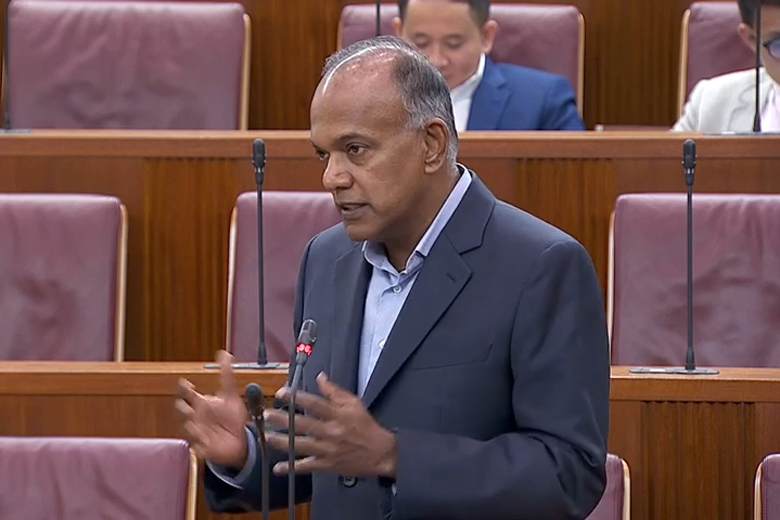Parliament: Laws to be strengthened to combat foreign interference in domestic politics and threats to religious harmony, says Shanmugam
Sign up now: Get ST's newsletters delivered to your inbox

Home Affairs and Law Minister K. Shanmugam said the impact of foreign interference on countries is known and documented.
PHOTO: GOV.SG
Fabian Koh
Follow topic:
SINGAPORE - Laws to tackle foreign interference in Singapore's domestic politics and threats to religious harmony will be strengthened and reviewed, among other measures, said Home Affairs and Law Minister K. Shanmugam on Friday (March 1).
Speaking in Parliament during a debate on the budget of the Ministry of Home Affairs, Mr Shanmugam said the impact of foreign interference is known and documented.
Hostile information campaigns have been used to weaken countries' resolve in a time of conflict or tension between states, while foreign actors have also attempted to undermine democracy and elections in a number of jurisdictions, which can divide a country and tear its social fabric, he added.
Mr Shanmugam also cited cases of foreign interference in Singapore's domestic politics that were shared in Parliament last month by Senior Minister of State for Law Edwin Tong.
Mr Tong said that when the dispute with Malaysia over maritime and airspace issues last year was top news, there was a "curious" spike in online comments critical of Singapore, made using what are "essentially" anonymous accounts.
Mr Shanmugam said that Singapore's thinking in dealing with the threat of foreign interference is that early detection and exposure would be key.
"Second, we must be able to act quickly, and keep up with new digital-age tactics. Third, apart from strengthening our laws, we have to build up the ability of Singaporeans to understand what is happening, to discern, to respond appropriately, to try to resist foreign interference," said Mr Shanmugam, adding that the Government will soon present its proposals for legislation.
He said Singapore is now studying efforts by other countries, such as Germany and Australia, that have passed laws to combat foreign interference.
For instance, he said the Network Enforcement Act in Germany requires social media platforms to set up a process that ensures "manifestly illegal content" such as hate speech are removed within 24 hours upon receipt of a complaint.
Failure to comply could draw a fine of up to €50 million (S$76.8 million).
In Australia, he said, those who act on behalf of foreign nations or entities must declare the relationship or risk facing up to five years' jail.
Foreign interference aimed at influencing elections or supporting foreign intelligence could face a penalty of 20 years' jail.
Responding to questions from several MPs, Mr Shanmugam also addressed the threats to Singapore's religious harmony, as he identified three "worrisome trends".
First, the resurgence of identity politics worldwide have seen more people identifying themselves in "narrow ethnic, cultural, religious terms", causing them to reject diversity and co-existence with others, he said.
There have also been political parties and movements that ride this wave successfully, as seen in the progress made by far-right parties in France, the Netherlands and Germany.
Mr Shanmugam added that there has also been significant support for religion-based politics and parties "in our immediate region".
The other two trends: the Internet has allowed hate speech and incitement to spread further and faster; and religiously motivated terrorist groups continue to sow discord.
To preserve religious harmony in Singapore, Mr Shanmugam said a strong Singaporean identity has to be built and prioritised ahead of religion as a marker of identity.
Citing the education system, public housing and national service as examples of common spaces where people of different backgrounds mix, he said we have to build a "strong Singaporean identity through these common experiences", and that religion is not an exclusive identity marker.
He also stressed the need to keep religion and politics separate.
"Our politics, our approach, is secular in nature. We have managed to balance the right to religious freedom, with the need to ensure harmony, peace and security," he said.
The Government is reviewing the Maintenance of Religious Harmony Act, with more details to be shared after consultation.
Singaporeans must also continue the culture of mutual respect for one another's religions, and reach out across religious lines to keep the avenues of conversation open, said Mr Shanmugam, who also gave an overview of Singapore's security situation in his speech.
"Religious harmony is built and nurtured on the basis of trust among the communities. The Government will continue to provide platforms to facilitate dialogue and build this trust," he added.

